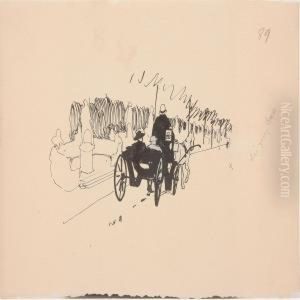Gustav Wied Paintings
Gustav Wied was a Danish writer and dramatist, born on March 6, 1858, in Branderslev, Denmark. He was known for his satirical and often controversial works that critiqued and humorously depicted the hypocrisy and narrow-mindedness of the Danish provincial bourgeoisie. Wied's literary career is marked by a strong sense of social criticism and a unique blend of cynicism and compassionate insight into the human condition.
Wied initially trained to be a pharmacist, a profession he pursued for a short period, but he found his true calling in literature. His early works, which include 'Livsens Ondskab' (Malice of Life) and 'Knagsted', were characterized by their sharp wit and the portrayal of tragicomic characters, who often suffer under the constraints of societal norms. Wied's writing style combined naturalism and satire, which allowed him to explore and expose the absurdities and injustices of late 19th-century Danish society.
Despite facing criticism and even outrage for his often acerbic portrayal of the middle class and the clergy, Wied's works were popular among readers who appreciated his talent for storytelling and his ability to articulate social critique without forsaking entertainment. His plays, like 'Skærmydsler' (Skirmishes) and 'Kærlighed' (Love), although not as successful as his novels, further demonstrated his skillful dialogue and insightful characterizations.
Gustav Wied's life came to a tragic end when he committed suicide on October 24, 1914, in his home at Nørre Vedby, Denmark. His death was a loss to Danish literature, and he is remembered for his contributions to the critical examination of society through his piercing and often humorous prose. Today, Wied's works are considered classics of Danish literature and they continue to be read and studied for their literary merit and historical relevance.

